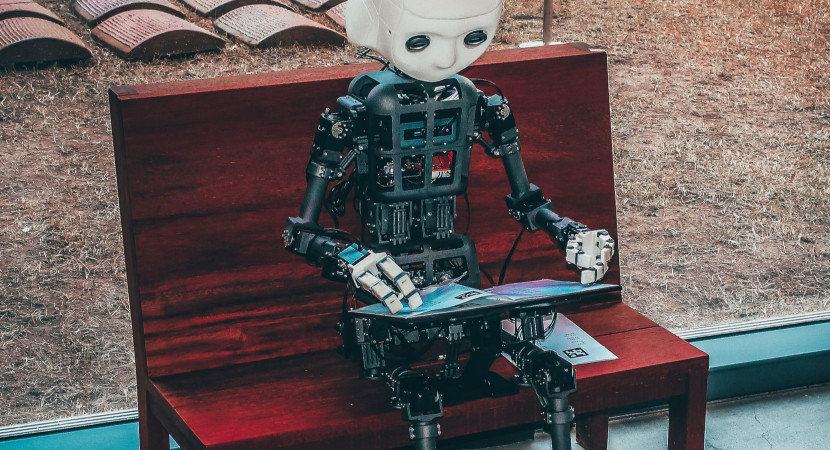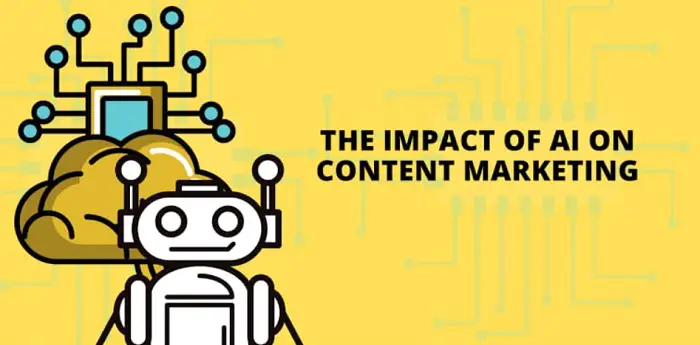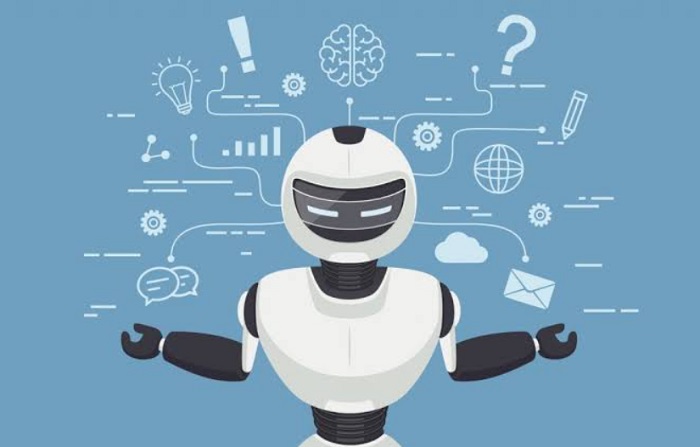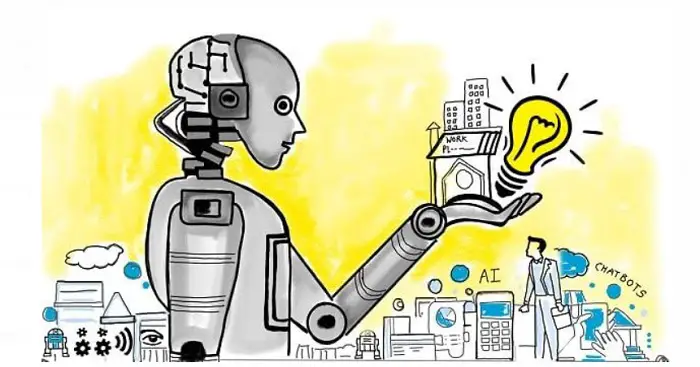Artificial intelligence in the content marketing industry is revolutionizing by providing marketers with powerful tools to create, personalize and optimize content for maximum impact.
AI can completely change how content is made, distributed, and measured, making it easier for marketers to drive measurable results and increase ROI.
This article will discuss the impact of AI on content marketing, how you can use it to create more effective campaigns and the potential associated risks.
See Also: How does Content Marketing for Hotels Work?
What is the impact of Artificial Intelligence on Content Marketing?
Artificial intelligence (AI) is becoming a more significant factor in the effectiveness of content marketing, which has become a crucial component of any marketing strategy.
AI is used to optimize content marketing in various ways, from improving the quality of content to streamlining processes and increasing relevance.
1. Automated Content Creation:
AI can help marketers create personalized and engaging content for their target audience without needing manual labor.
AI can evaluate customer data and produce highly relevant content personalized to the reader. AI-powered content creation platforms can produce high-quality content with minimal human intervention.
2. Automated Content Optimization:
AI can optimize content for search engine optimization (SEO). Tools with artificial intelligence (AI) can evaluate customer data and improve content for higher search engine rankings.
The customer’s experience can be better by using AI to customize content and make it more pertinent to their needs.
3. Automated Content Distribution:
It is possible with the aid of artificial intelligence. Tools with AI capabilities can spot patterns in consumer behavior and deliver material to the appropriate audience at the correct time.
Marketing professionals can boost their visibility and reach more clients in this way.
4. Improved Customer Engagement:
AI can improve customer engagement by providing more personalized content and better targeting.
Tools with AI capabilities can evaluate client data and produce content specific to their requirements and preferences, which may improve client loyalty and engagement.
Top 6 Benefits Of Artificial Intelligence For Content Marketing
Content Optimization
AI can help marketers optimize their content by analyzing its performance and suggesting improvements. AI can help marketers identify the keywords and phrases most impacting their audience.
It can also help marketers track their content performance, so they can make changes based on what works and what doesn’t.
Predictive Analysis
AI can help marketers predict the future performance of their content. AI can analyze past performance and use predictive analytics to determine what content will likely have the most success.
This can assist marketers in more efficiently allocating their resources and producing content that has the most significant potential for success.
3. Content Generation
AI can support content creation and idea generation for marketers. AI-powered tools can generate new ideas based on past content performance, user data, and other factors.
As well as writing articles and blog entries, AI can produce videos.
4. Lead Generation
AI can help marketers generate leads by analyzing user data and providing insights into their target audience. AI-powered tools can identify users most likely to convert and send personalized messages to them.
Marketers may target the proper demographic more effectively and raise their lead generation potential by doing so.
5. Performance Tracking
AI can help marketers track the performance of their content, so they can identify what works and what doesn’t. AI-powered tools can provide insights into the performance of different pieces of content, so marketers can make adjustments as needed.
This can aid in content optimization and guarantee that marketers get the most return on their investment.
6. Social Media Management
Marketing professionals may employ artificial intelligence (AI) to effectively manage their social media platforms.
AI-powered tools can monitor social media accounts and provide insights into user behavior. They can also help marketers identify performing content and adjust their strategy accordingly.
6. Trend Analysis
AI can help marketers identify emerging trends and adjust their content strategy accordingly.
AI-powered tools can analyze user data and identify trends that are likely to have an impact on their target audience. This can help marketers stay ahead of the curve and create relevant and engaging content.
Check this out: Content Marketing: Create Engaging Content for Your Website
Potential risks Of Artificial Intelligence For Content Marketing
The future of AI in content marketing is a potential winner that looks intriguing. However, using artificial intelligence (AI) for content creation entails significant dangers.
1. Data Security Risks
Artificial Intelligence (AI)-powered content marketing solutions store, process, and analyze customer data, leading to security risks as the technology requires greater security due to its youth.
2. Bias
The data that AI systems are privy to can bias them, providing unreliable and potentially harmful results. AI algorithms should be regularly reviewed and tested to ensure they do not perpetuate bias.
3. Black-box Syndrome
AI solutions are often referred to as ‘black-box‘ solutions, meaning they are self-contained and cannot be easily understood or explained.
This can lead to confusion and mistrust amongst customers and stakeholders, damaging the company’s reputation.
4. Job Loss
AI-driven solutions can lead to job losses as specific tasks are automated and no longer require human input. Companies may need more capacity to re-train and re-deploy employees.
5. Regulatory Compliance
AI solutions may not comply with specific regulations and laws, and companies may need to be aware of their obligations.
6. ChatGPT Effects
Chat Generative or ChatGPT Pre-trained Transformer is a chatbot operated by artificial intelligence that creates conversations that sound like human-to-human communication. Thus, doing a ChatGPT Coding Course will put you ahead of the curve!
This can lead to confusion amongst customers and stakeholders, as it is difficult to tell the difference between humans and machines.
7. Accuracy
AI solutions are not 100% accurate, and mistakes can occur. Customer resentment may result from this, harming the business’s reputation.
8. Privacy
AI solutions can collect, store, and analyze customer data, leading to privacy issues if customer data is not secured correctly. To safeguard client data, organizations must make sure they have a firm privacy policy in place.
9. Cost
AI solutions can be expensive to purchase, develop, and maintain, and companies must have the necessary resources to ensure the solution is successful.
10. Over-reliance
Companies can become over-reliant on AI solutions, leading to problems if the solution fails or is no longer relevant.
To guarantee continuity, organizations must make sure they have a backup plan.
FAQs
What effect does AI technology have on content marketing?
Artificial intelligence is helping to revolutionize content marketing by making it easier to create more personalized content, automate marketing tasks, and measure the effectiveness of campaigns.
How can artificial intelligence enhance content marketing?
Artificial intelligence can help content marketers create more personalized content and target the right audience. Additionally, AI can automate marketing tasks and measure the effectiveness of campaigns.
What are the benefits of using artificial intelligence in content marketing?
By using artificial intelligence in content marketing, businesses can create more personalized content, automate marketing tasks, and measure the effectiveness of campaigns. This can lead to more efficient and successful marketing efforts.
Conclusion
In the digital age, AI for content personalization has become a crucial component of content marketing. AI provides the opportunity to customize content to match the needs and interests of individual users, resulting in increased engagement, relevance, and ROI.
AI-powered content personalization has the potential to revolutionize the way businesses and organizations create and deliver content to their audiences.
Automation content personalization is here to remain and will continue to affect content marketing in the long term. AI and content creation are essential elements of successful content marketing and are here to stay.








